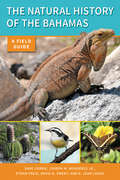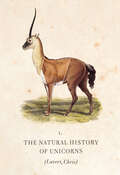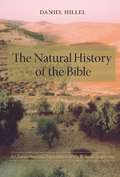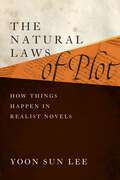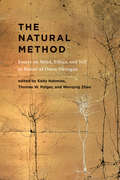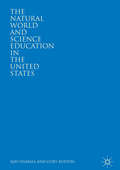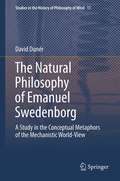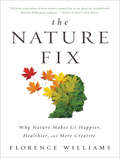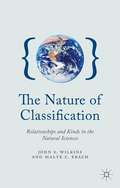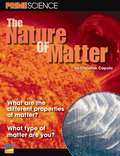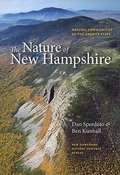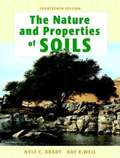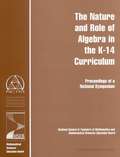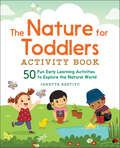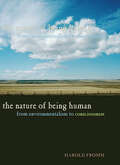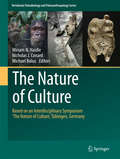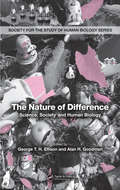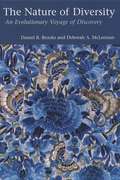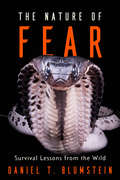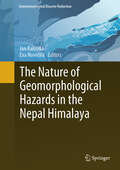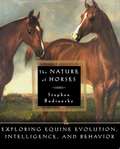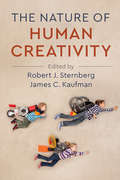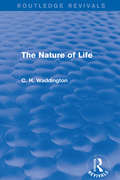- Table View
- List View
The Natural History of The Bahamas: A Field Guide
by Dave Currie Joseph M. Wunderle Jr. Ethan Freid David N. Ewert D. Jean LodgeTake this book with you on your next trip to the Bahamas or the Turks and Caicos Islands or keep it close to hand in your travel library. The Natural History of the Bahamas offers the most comprehensive coverage of the terrestrial and coastal flora and fauna on the islands of the Bahamas archipelago, as well as of the region's natural history and ecology. Readers will gain an appreciation for the importance of conserving the diverse lifeforms on these special Caribbean islands. A detailed introduction to the history, geology, and climate of the islands. Beautifully illustrated, with more than seven hundred color photographs showcasing the diverse plants, fungi, and animals found on the Bahamian Archipelago.
The Natural History of Unicorns
by Chris Lavers“Lavers keeps his intellectual detective story passionate and suspenseful.”— Washington Post Book WorldFrom Biblical stories about virgins to adventures with Harry Potter, unicorns have enchanted people for millennia. In the endlessly fascinating The Natural History of Unicorns, author Chris Lavers ingeniously traces the legend of this mysterious creature to the real people, places, and animals that have influenced its story.
The Natural History of the Bible: An Environmental Exploration of the Hebrew Scriptures
by Daniel HillelTraversing river valleys, steppes, deserts, rain-fed forests, farmlands, and seacoasts, the early Israelites experienced all the contrasting ecological domains of the ancient Near East. As they grew from a nomadic clan to become a nation-state in Canaan, they interacted with indigenous societies of the region, absorbed selective elements of their cultures, and integrated them into a radically new culture of their own. Daniel Hillel reveals the interplay between the culture of the Israelites and the environments within which it evolved. More than just affecting their material existence, the region's ecology influenced their views of creation and the creator, their conception of humanity's role on Earth, their own distinctive identity and destiny, and their ethics.In The Natural History of the Bible, Hillel shows how the eclectic experiences of the Israelites shaped their perception of the overarching unity governing nature's varied manifestations. Where other societies idolized disparate and capricious forces of nature, the Israelites discerned essential harmony and higher moral purpose. Inspired by visionary prophets, they looked to a singular, omnipresent, omnipotent force of nature mandating justice and compassion in human affairs. Monotheism was promoted as state policy and centralized in the Temple of Jerusalem. After it was destroyed and the people were exiled, a collection of scrolls distilling the nation's memories and spiritual quest served as the focus of faith in its stead.A prominent environmental scientist who surveyed Israel's land and water resources and has worked on agricultural development projects throughout the region, Daniel Hillel is a uniquely qualified expert on the natural history of the lands of the Bible. Combining his scientific work with a passionate, life-long study of the Bible, Hillel offers new perspectives on biblical views of the environment and the origin of ethical monotheism as an outgrowth of the Israelites' internalized experiences.
The Natural Laws of Plot: How Things Happen in Realist Novels (Alembics: Penn Studies in Literature and Science)
by Yoon Sun LeeIs plot a line, an arc, or a shape? None of these. Rather than thinking of plot as a sequence of events or actions put into place solely through human agency against the backdrop of setting, this book questions why we should distinguish between plot and setting—and indeed, whether we can make such a distinction. After all, plot, Yoon Sun Lee contends, cannot be disentangled from the material setting in which it takes place.In The Natural Laws of Plot, Lee connects the history of the novel and the history of science to show how plot in the realist novel is given shape by the characteristics of the physical world—and how in turn, plot serves as the avenue through which the realist novel participates in the same lines of inquiry about the world as pursued by the natural and physical sciences. Lee argues that the novel emerges and evolves in tandem with the development of scientific practices and concepts in eighteenth- and nineteenth-century Europe to investigate the idea of a unified and objective world. Drawing on readings from Defoe, Austen, Scott, and many others, Lee demonstrates how bodies, human and non-human, behave according to laws that are built into worlds by plot, and how they are subject to causes and consequences that can occur independently of individual action, social forces, or metaphysical destiny. This interest in representing and exploring how things happen sets the novel apart from other literary genres, and makes the history of science integral to the understanding of the history and theory of the novel, and of narrative.Plot, Lee shows us, is immersive and powerful, because it satisfies our wish to know how things happen in a coherent, objective, and possibly real world.
The Natural Method: Essays on Mind, Ethics, and Self in Honor of Owen Flanagan
by Eddy Nahmias, Thomas W. Polger, and Wenqing ZhaoProminent philosophers explore themes in the work of Owen Flanagan, focusing on debates about the nature of mind, the self, and morality.Owen Flanagan's work offers a model for how to be a naturalistic and scientifically informed philosopher who writes beautifully and deeply about topics as varied as consciousness and Buddhism, moral psychology and dreaming, identity and addiction, literature and neuroscience. In this volume, leading philosophers--Flanagan's friends, colleagues, and former students--explore themes in his work, focusing on debates over the nature of mind, the self, and morality. Some contributors address Flanagan's work directly; others are inspired by his work or methodology. Their essays are variously penetrating and synoptic, cautious and speculative.
The Natural Philosophy of Margaret Cavendish: Reason and Fancy during the Scientific Revolution (The Johns Hopkins University Studies in Historical and Political Science #128)
by Lisa T. SarasohnHonorable Mention, Typographic Covers, Large Nonprofit Publishers, 2010 Washington Book Publishers ShowMargaret Cavendish, Duchess of Newcastle, led a remarkable—and controversial—life, writing poetry and prose and philosophizing on the natural world at a time when women were denied any means of a formal education. Lisa T. Sarasohn acutely examines the brilliant work of this untrained mind and explores the unorthodox development of her natural philosophy. Cavendish wrote copiously on such wide-ranging topics as gender, power, manners, scientific method, and animal rationality. The first woman to publish her own natural philosophy, Cavendish was not afraid to challenge the new science and even ridiculed the mission of the Royal Society. Her philosophy reflected popular culture and engaged with the most radical philosophies of her age. To understand Cavendish’s scientific thought, Sarasohn explains, is to understand the reception of new knowledge through both insider and outsider perspectives in early modern England. In close readings of Cavendish’s writings—poetry, treatises, stories, plays, romances, and letters—Sarasohn explores the fantastic and gendered elements of her natural philosophy. Cavendish saw knowledge as a continuum between reason and fancy, and her work integrated imaginative speculation and physical science. Because she was denied the university education available to her male counterparts, she embraced an epistemology that favored contemplation and intuition over logic and empiricism. The Natural Philosophy of Margaret Cavendish serves as a guide to the unusual and complex philosophy of one of the seventeenth century’s most intriguing minds. It not only celebrates Cavendish as a true figure of the scientific age but also contributes to a broader understanding of the contested nature of the scientific revolution.
The Natural World and Science Education in the United States
by Ajay Sharma Cory BuxtonThis book focuses on the representation of nature in science education in schools in the United States. Given the importance of our relationship with the nonhuman world for the fate of our planet, this work gives special attention to the representation, instruction, and understanding of the relationship between the social and the natural world. It also proposes an alternative, sustainability science-based conceptual framework for ecology and environmental science topics in science education, which is compatible with the current social-ecological understanding of life in the Anthropocene epoch.
The Natural philosophy of Emanuel Swedenborg
by David DunérAlthough Emanuel Swedenborg (1688-1772) is commonly known for his spiritual philosophy, his early career was focused unnatural science. During this period, Swedenborg thought of the world was like a gigantic machine, following the laws of mechanics and geometry. This volume analyzes this mechanistic worldview from the cognitive perspective, by means of a study of the metaphors in Swedenborg's texts. The author argues that these conceptual metaphors are vital skills of the creative mind and scientific thinking, used to create visual analogies and abstract ideas. This means that Swedenborg's mechanistic and geometrical worldview, allowed him to perceive the world as mechanical and geometrical. Swedenborg thought "with" books and pens. The reading gave him associations and clues, forced him to interpret, and gave him material for his intellectual development.
The Natural philosophy of Emanuel Swedenborg: A Study in the Conceptual Metaphors of the Mechanistic World-View (Studies in the History of Philosophy of Mind #11)
by David DunerAlthough Emanuel Swedenborg (1688–1772) is commonly known for his spiritual philosophy, his early career was focused unnatural science. During this period, Swedenborg thought of the world was like a gigantic machine, following the laws of mechanics and geometry. This volume analyzes this mechanistic worldview from the cognitive perspective, by means of a study of the metaphors in Swedenborg’s texts. The author argues that these conceptual metaphors are vital skills of the creative mind and scientific thinking, used to create visual analogies and abstract ideas. This means that Swedenborg’s mechanistic and geometrical worldview, allowed him to perceive the world as mechanical and geometrical. Swedenborg thought ”with” books and pens. The reading gave him associations and clues, forced him to interpret, and gave him material for his intellectual development.
The Nature Fix: Why Nature Makes us Happier, Healthier, and More Creative
by Florence WilliamsAn intrepid investigation into nature’s restorative benefits by a prize-winning author. For centuries, poets and philosophers extolled the benefits of a walk in the woods: Beethoven drew inspiration from rocks and trees; Wordsworth composed while tromping over the heath; and Nikola Tesla conceived the electric motor while visiting a park. Intrigued by our storied renewal in the natural world, Florence Williams set out to uncover the science behind nature’s positive effects on the brain. In this informative and entertaining account, Williams investigates cutting-edge research as she travels to fragrant cypress forests in Korea to meet the rangers who administer “forest healing programs,” to the green hills of Scotland and its “ecotherapeutic” approach to caring for the mentally ill, to a river trip in Idaho with Iraqi vets suffering from PTSD, to the West Virginia mountains where she discovers how being outside helps children with ADHD. The Nature Fix demonstrates that our connection to nature is much more important to our cognition than we think and that even small amounts of exposure to the living world can improve our creativity and enhance our mood. In prose that is incisive, witty, and urgent, Williams shows how time in nature is not a luxury but is in fact essential to our humanity. As our modern lives shift dramatically indoors, these ideas—and the answers they yield—are more urgent than ever.
The Nature Of Classification
by Malte C. Ebach John S. WilkinsDiscussing the generally ignored issue of the classification of natural objects in the philosophy of science, this book focuses on knowledge and social relations, and offers a way to understand classification as a necessary aspect of doing science.
The Nature Of Matter
by Brett Kelly Christine Caputo Kylee SolariWhat is our world made of? The answer is matter. The water you drink and the air you breathe is matter. You are matter, too. Read this book (which is also matter, by the way) to find out about different types of matter and their properties. (Set of 10)
The Nature Of New Hampshire: Natural Communities Of The Granite State
by Daniel Sperduto Ben KimballThis illuminating and instructive book explores New Hampshire’s stunning mosaic of natural communities. In photos, drawings, and accessible text, The Nature of New Hampshire takes you on a tour of landscapes as varied as alpine meadows, tidal marshes, riverbanks, forests, ponds, dunes, and cliffs. Readers will gain a new understanding and appreciation for the state’s exceptional natural heritage. Natural communities are recurring associations of plants and animals found in particular physical environments. They are the dynamic habitats in which native species live. Based on more than twenty years of ecological research, the New Hampshire Natural Heritage Bureau developed the classification of the nearly 200 natural community types presented in this essential guide. The communities are organized into eight categories: alpine and subalpine, rocky ground, forests, peatlands, swamps, marshes, river channels and floodplains, and seacoast. With gorgeous photographs, informative text, and recommended places to visit, The Nature of New Hampshire provides an important common language for conservation planning and informed land stewardship. Whether used as a field guide or an at-home resource, this book will help readers reconnect with their surroundings, and understand the places they value.
The Nature and Properties of Soils
by Nyle C. Brady Ray R. WeilThe Nature and Property of Soils is an engaging book for readers. It has an ecological approach that explains the fundamentals of soil science effectively. Chapter topics include Soil Erosion and Its Control, Soil Acidity, Soils and Chemical Pollution, and Organisms and the Ecology of the Soil. For individuals interested in soil and the environment.
The Nature and Role of Algebra in the K-14 Curriculum: Proceedings of a National Symposium May 27 and 28, 1997
by National Council of Teachers of MathematicsA report on The Nature and Role of Algebra in the K-14 Curriculum
The Nature for Toddlers Activity Book: 50 Fun Early Learning Activities to Explore the Natural World
by Jenette RestivoGo exploring with 50 outdoor activities for toddlers!Nature is full of sights, sounds, and textures to fascinate toddlers and engage their growing minds. Encourage them to discover the world around them with this book of hands-on nature activities. From Rainy Day Puddle Stomping to Rock Stacking and Creating a Bird Feeding Station, your little one will practice key skills as they build a love of the great outdoors. Learning in action—Watch as your toddler begins to ask questions, recognize cause and effect, sort objects, and develop their motor skills. Anytime and anywhere—Most of these activities only take about 20 minutes, use basic household items, and can be done in your backyard, your local park, or around the neighborhood. Every part of nature—Dig into activities that teach toddlers about weather and seasons, soil and rocks, creatures and critters, and green things that grow! Get little ones excited to get outside w ith The Nature for Toddlers Activity Book.
The Nature of Being Human: From Environmentalism to Consciousness
by Harold FrommAlthough the physical relationship between the natural world and individuals is quantifiable, the psychosocial effect of the former on the latter is often less tangible. What, for instance, is the connection between the environment in which we live and our creativity? How is our consciousness bounded and delimited by our materiality? And from whence does our idea of self and our belief in free will derive and when do our surroundings challenge these basic assumptions? Ecocritic Harold Fromm's challenging exploration of these and related questions twines his own physical experiences and observations with insights gathered from both the humanities and the sciences. Writing broadly and personally, Fromm explores our views of nature and how we write about it. He ties together ecology, evolutionary psychology, and consciousness studies to show that our perceived separation from our surroundings is an illusory construct. He argues for a naturalistic vision of creativity, free will, and the literary arts unimpeded by common academic and professional restraints. At each point of this intellectual journey, Fromm is honest, engaging, and unsparing.Philosophical, critical, often personal, Fromm's sweeping, interdisciplinary, and sometimes combative essays will change the way you think about your place in the environment.
The Nature of Culture
by Miriam N. Haidle Nicholas J. Conard Michael BolusThis volume introduces a model of the expansion of cultural capacity as a systemic approach with biological, historical and individual dimensions. It is contrasted with existing approaches from primatology and behavioural ecology; influential factors like differences in life history and demography are discussed; and the different stages of the development of cultural capacity in human evolution are traced in the archaeological record. The volume provides a synthetic view on a) the different factors and mechanisms of cultural development, and b) expansions of cultural capacities in human evolution beyond the capacities observed in animal culture so far. It is an important topic because only a volume of contributions from different disciplines can yield the necessary breadth to discuss the complex subject. The model introduced and discussed originates in the naturalist context and tries to open the discussion to some culturalist aspects, thus the publication in a series with archaeological and biological emphasis is apt. As a new development the synthetic model of expansion of cultural capacity is introduced and discussed in a broad perspective.
The Nature of Difference: Science, Society and Human Biology (PBK) (Society for the Study of Human Biology)
by Alan H. Goodman George T. H. EllisonUnprecedented advances in genetics and biotechnology have brought profound new insights into human biological variation. These present challenges and opportunities for understanding the origins of human nature, the nature of difference, and the social practices these sustain. This provides an opportunity for cooperation between the biological and s
The Nature of Diversity: An Evolutionary Voyage of Discovery
by Daniel R. BrooksAll living things on earth—from individual species to entire ecosystems—have evolved through time, and evolution is the acknowledged framework of modern biology. Yet many areas of biology have moved from a focus on evolution to much narrower perspectives. Daniel R. Brooks and Deborah A. McLennan argue that it is impossible to comprehend the nature of life on earth unless evolution—the history of organisms—is restored to a central position in research. They demonstrate how the phylogenetic approach can be integrated with ecological and behavioral studies to produce a richer and more complete picture of evolution. Clearly setting out the conceptual, methodological, and empirical foundations of their research program, Brooks and McLennan show how scientists can use it to unravel the evolutionary history of virtually any characteristic of any living thing, from behaviors to ecosystems. They illustrate and test their approach with examples drawn from a wide variety of species and habitats. The Nature of Diversity provides a powerful new tool for understanding, documenting, and preserving the world's biodiversity. It is an essential book for biologists working in evolution, ecology, behavior, conservation, and systematics. The argument in The Nature of Diversity greatly expands upon and refines the arguments made in the authors' previous book Phylogeny, Ecology, and Behavior.
The Nature of Fear: Survival Lessons From The Wild
by Daniel T. BlumsteinA leading expert in animal behavior takes us into the wild to better understand and manage our fears.Fear, honed by millions of years of natural selection, kept our ancestors alive. Whether by slithering away, curling up in a ball, or standing still in the presence of a predator, humans and other animals have evolved complex behaviors in order to survive the hazards the world presents. But, despite our evolutionary endurance, we still have much to learn about how to manage our response to danger.For more than thirty years, Daniel Blumstein has been studying animals’ fear responses. His observations lead to a firm conclusion: fear preserves security, but at great cost. A foraging flock of birds expends valuable energy by quickly taking flight when a raptor appears. And though the birds might successfully escape, they leave their food source behind. Giant clams protect their valuable tissue by retracting their mantles and closing their shells when a shadow passes overhead, but then they are unable to photosynthesize, losing the capacity to grow. Among humans, fear is often an understandable and justifiable response to sources of threat, but it can exact a high toll on health and productivity.Delving into the evolutionary origins and ecological contexts of fear across species, The Nature of Fear considers what we can learn from our fellow animals—from successes and failures. By observing how animals leverage alarm to their advantage, we can develop new strategies for facing risks without panic.
The Nature of Geomorphological Hazards in the Nepal Himalaya (Geoenvironmental Disaster Reduction)
by Jan Kalvoda Eva NovotnáThe book offers a wide range of research topics that are addressed with the aim of contributing to the knowledge of geomorphological hazards in the Himalaya. It is emphasized the integration of climate-driven morphogenetic and tectonic processes in the Nepal Himalaya as a substantial phenomenon of active collisional orogeny. The extreme dynamics of landform evolution in the Himalayan terranes triggers severe natural hazards and risks. Interdisciplinary research of geomorphological processes and events related to natural hazards in the Nepal Himalaya follows general efforts to reduce geoenvironmental disasters. Visual documentation is of particular importance in the conception of the book, which is intended for specialized researchers as well as students.
The Nature of Horses: Exploring Equine Evolution, Intelligence, and Behavior
by Stephen BudianskyA scientific look at the origins, behavior, intelligence and language of the horse, based on cutting-edge research on horses' vision, biology and movement. Horses have a shared history with man going back millennia to their domestication around 4000 B. C. Yet only in very recent years have scientists begun to turn the tools of modern science on this remarkable animal that has been so wrapped up in human dreams and legends. Now modern scientific research is beginning to explain long-standing mysteries about the true nature of the horse. How well can horses really see? What causes breakdowns in racehorses? How intelligent are they compared to other animals, and are some breeds smarter than others? Does nature or nurture matter more in creating a great sport horse? What causes cribbing and other vices? In this beautifully illustrated, compelling narrative, Budiansky tells the story of the origins, behavior, intelligence and language of the horse. For the first time, horse lovers will have access to cutting-edge research on topics of interest including new information on horse vision, horse biology and movement. Introducing the latest archeological findings, Budiansky presents a fascinating discussion of how the horse evolved as well as a dramatic and provocative history of man's use and abuse of the horse from prehistoric times to today. In a revealing chapter on horse intelligence, he debunks the commonly held belief that horses are stupid and also presents compelling new scientific information on horse language which will greatly benefit the horse rider and trainer. Finally, drawing together the latest research on horse physiology, genetics and biomechanics, Budiansky asks the million dollar question -- what makes for a winning racehorse? Anyone who loves horses will find this an invaluable resource as well as a fascinating read.
The Nature of Human Creativity
by Robert J. Sternberg James C. KaufmanThis book provides an overview of the approaches of leading scholars to understanding the nature of creativity, its measurement, its investigation, its development, and its importance to society. <P><P>The authors are the twenty-four psychological scientists who are most frequently cited in the four major textbooks on creativity, and they can thus be considered among the most eminent living scholars in the field. <P>Authors discuss how they define creativity, the kinds of questions they have addressed, theories they have proposed, and a description of their research and the most interesting empirical results it has produced. The chapters represent a wide range of substantive and methodological emphases, including psychometric, cognitive, expertise-based, developmental, neuropsychological, cultural, systems, and group-difference approaches. <P>The Nature of Human Creativity brings together an incredible diversity of viewpoints, helping students and researchers to see the points of consensus as well as the differences in contemporary perspectives.<P>The authors are the most commonly cited in the major texts in the field, allowing readers to learn from the research of the leaders in the field.<P> Each chapter author answers a standardized list of questions, making the volume easy to navigate.<P> A wide variety of approaches to human creativity are presented, helping readers to see the points of consensus and differences in perspective within the field.
The Nature of Life (Routledge Revivals: Selected Works of C. H. Waddington)
by C. H. WaddingtonFirst published in 1961, this book explains the main trends and problems in modern biological thought, at that time. It was based on lectures presented at the University College of the West Indies, Jamaica, in 1960 to members from different faculties and is therefore an accessible guide for all to the subject.
